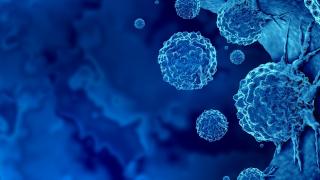From April 10 to 15, the brightest minds in the field of oncology and medicine will gather for the first week of this year’s all-virtual AACR Annual Meeting. The conference which is held over two separate weeks, the second of which is May 17-21, brings experts from around the world together to present clinical trial findings for the first time, share field-changing basic and translational science breakthroughs and discuss groundbreaking insights that will move the field of oncology forward. Registered attendees have access to many of the sessions, including recordings of all live sessions and panels, on demand from the day of the scheduled presentation through June 21, 2021.

Our world-class experts share novel treatment approaches, innovative CAR T cell therapies and epidemiologic insights for cancer
To see all of the research our physician-scientists are presenting, access City of Hope’s Program Guide here . Highlighted presentations from City of Hope experts include:
Click on the Watch on YouTube button below to view our interview list of experts presenting at AACR 2021.
In an oral presentation, Marianna Koczywas, M.D., will be discussing findings from a Phase 1 clinical trial of RMC-4630, a SHP2 inhibitor, monotherapy in adult patients with relapsed or refractory solid tumors that contain hyperactivated RAS-MAPK pathway mutations. These pathways affect regulation of cell growth and survival, and mutant forms of RAS rely on signaling from SHP2 for oncogenic activity. Inhibition of SHP2 has the ability to inhibit oncogenic activity, making RMC-4630 a potential treatment option for cancers that are driven by SHP2-dependent mutations. (Abstract LB001)
Immunotherapies, like chimeric antigen receptor (CAR) T cell therapy, harness the body’s inherent defenses with the goals of targeting and eliminating cancer. Efforts to improve the effectiveness of CAR T cell therapy for patients with glioblastoma (GBM) are under development at City of Hope, and the research of Christine Brown, Ph.D., evaluating the relationship between CAR T cell therapy and the tumor microenvironment of GBM now offers new and important insights into the reciprocal relationship between productive CAR therapy and the host immune system. Brown and her team established CAR T cell treatment that activated and led to a less suppressive tumor microenvironment, altered the tumor immune landscape and induced endogenous T cell memory responses. Additionally, they showed that the CAR T cell-dependent activation of the host immune system was also associated with a complete response in a patient. The findings show that by reshaping the tumor microenvironment, CAR T cell therapy can elicit endogenous anti-tumor immune responses. (Abstract 59)
Kun-Yu Teng, Ph.D., will be sharing a video-poster detailing the development of the CAR natural killer (NK) cell therapy CYTO NK-203 directed against prostate stem cell antigen (PSCA). The antigen is expressed on approximately 60-80% of pancreatic cancers. The team, which also includes Michael Caligiuri, M.D. and Jianhua Yu, Ph.D., developed CYTO NK-203 to spontaneously kill both liquid and solid tumors in animal models using human umbilical cord NK cells that are transduced with a CAR. As NK cells utilize IL-15 to develop and proliferate against tumor cells, a soluble, secretable form was also incorporated into the CAR construct to enhance the cytotoxic functions of NK cells as well as its persistence in vivo.
When tested in PSCA+ human cell lines, the PSCA CAR NK cells produced greater TNFα and IFNγ when compared to PSCA CAR NK cells directed against a PSCA-negative cell line. Additionally, PSCA CAR NK therapy significantly suppresses tumor progression and prolongs the median survival of the treated mice in a metastatic pancreatic cancer model. These preliminary studies demonstrate efficacy against pancreatic tumor cells that could result in a novel form of cell therapy for PSCA+ solid tumors. The team plans to move CYTO NK-203, which was licensed to CytoImmune Therapeutics Inc., into clinical trials at City of Hope within 12 months. (Abstract LB154)
In order to better understand the role of adverse social conditions and neighborhood socioeconomic status (nSES) in the development of somatic KRAS mutations in nonsmall cell lung cancer (NSCLC), Loretta Erhunmwunsee, M.D., conducted a retrospective analysis of City of Hope NSCLC patients who received care from 2015-2018. Patients’ home addresses were geocoded and assigned census tract-level exposure to several indices of nSES conditions. From there, several logistic regressions to model the presence of somatic KRAS mutations in relation to exposure to various adverse nSES conditions were run. The data showed that living conditions may indeed play a role in NSCLC with aggressive mutations. Additional research needs to be conducted to consider locally specific nSES measures and nationally derived indexes in order to better understand the complex mixture of domains that make up disadvantaged neighborhood conditions. (Abstract 784)
Stephen Gruber, M.D., Ph.D., M.P.H., began studying clinical and epidemiologic factors that could be influencing T cell quantity and clonality within colorectal adenocarcinomas in an attempt to understand drivers of varying immune responses. The team conducted logistic regression, negative binomial regression and linear regression models for 2,750 cases from the Molecular Epidemiology of Colorectal Cancer Study. In addition to finding that epidemiologic variables including aspirin and statins were strongly associated with T cell clonality, the researchers also noted that stage distribution was representative of cancer incidence in the population and high microsatellite instability was observed in 14.2% of cases. These results indicate that certain immune responses could be mediated by modifiable factors and affect treatment. (Abstract 2737)